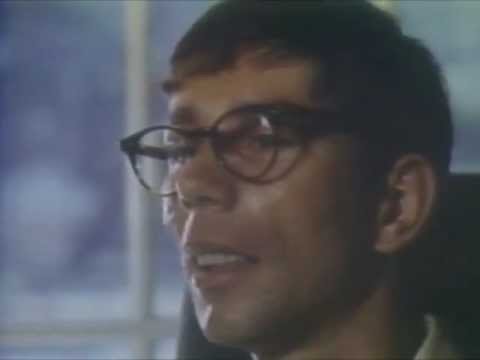
VIDEO ODDITIES,
or VHS: video house safari
~ by JOHN CRIBBS ~
For those just tuning in: what I'm doing in this series is heading down to the local video store and finding interesting movies I've never heard of. For younger readers, a "video store" is an establishment that you can walk or drive to and rent Video Home System cassettes, also known as VHS tapes, from an actual person and take it home for your own entertainment purposes (you gotta bring it back to the store when you're done, though.)
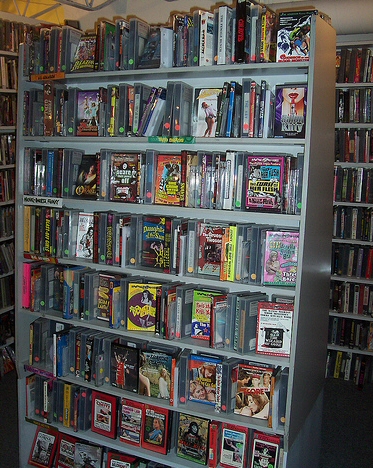 I'm basing my selections on the outrageous video boxes, the kind that helped us decide whether a movie looked like it was worth our time back in the days before the internet started telling us everything there is to know about every film before they're even released. Then I'm writing about my VHS safari.
I'm basing my selections on the outrageous video boxes, the kind that helped us decide whether a movie looked like it was worth our time back in the days before the internet started telling us everything there is to know about every film before they're even released. Then I'm writing about my VHS safari.
Then I'm writing about them - simple as that. With the inevitable extinction of the video store it's become more difficult to hunt down some of these more obscure titles... they're becoming harder to find than Bigfoot.
And the obsolescence is almost complete. Netflix didn't even wait for the dust to settle on Blockbuster's grave before taking measures to separate their streaming and mail rental divisions, an obvious move torwards dissolving the dvd service all together. Even though the ploy was met with a joyously, overwhelmingly negative response from customers, it's a small victory in a war whose outcome was determined long ago. Given the chance to make money and spend less, corporationswill find another quick route towards the total discontinuation of packaged media, no matter how many International Independent Video Store Days are allegedly observed. The adventurous and social side of home video entertainment has already been unobstructedly annihilated (the social network feature of the site, where you could connect with friends and trade recommendations, was the first thing Netflix jettisoned.) Now they seek to eliminate the cover, the spine... the hard copy of the movie itself. It doesn't feel like evolution, it feels like a bad dream. Hey, speaking of which...
{the VIDEO ODDITIES index}
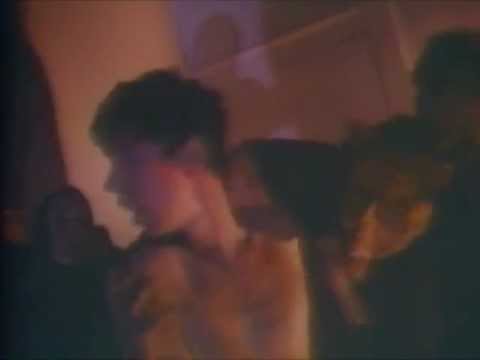
video oddity #10:
MY BROTHER HAS BAD DREAMS
(a.k.a. scream bloody murder)
robert j. emery, 1974
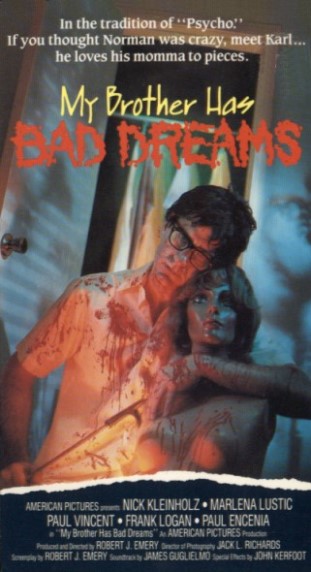
I could be bounded in a clamshell,
And count myself worthy of that video case,
If I were My Brother Has Bad Dreams.
- paraphrasing of Shakespeare.
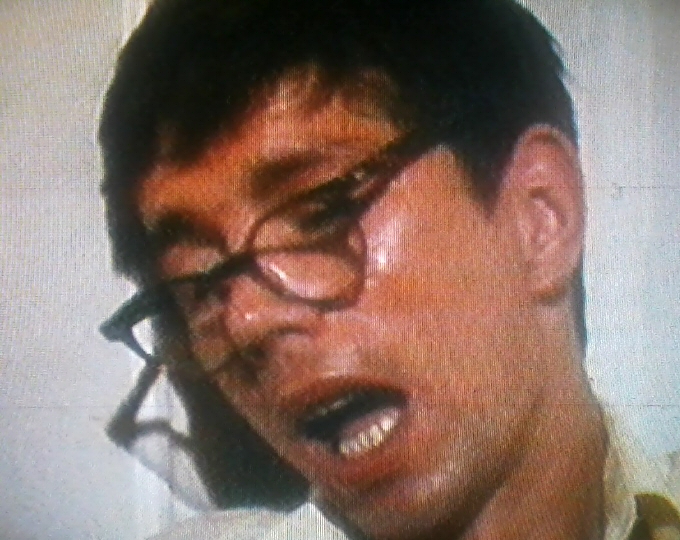
My Brother Has Bad Dreams begins quite artily, with a simple title card on white cutting to a soft flute and piano arrangement playing over the glistening surface of Tampa's tranquil waters just before dusk. Surfaces, hm'kay? Everything seems calm and pleasant but there's something unsettling going on - a storm brewing behind the clouds. The floodgates open during a fight between bespectacled, orthodontically-challenged Karl and his
wheelchair-bound mother in the first scene. While he's been out fishing, she's let a stray cat into the house, apparently indifferent to her son's intense ailurophobia. Karl flips out, grabs a fireplace poker and delivers a series of devastating blows to her skull. His sister Anna returns from the market mid-bludgeoning and begs Karl to stop, pointing out that his taciturn victim is in fact a store dummy that had been propped up in a wheelchair - mother's been dead for years, killed with the very same fireplace
poker by our alcoholic father, don't you remember! Anna calms her brother down and puts him to bed, but Karl's nubilous clashing of realities continues through a series of horrible nightmares...
You know how it is with brothers. My kid brother having bad dreams after seeing Predator turned out to be pivotal in me getting my own room for the first time in my life, since I would constantly wake my parents in the middle of the night to complain about him whining (a move that, in retrospect, was probably just an excuse on my part to get the hell out of that room in case there really was a goddamn predator in there.) In other words,
my brother's nightmares indirectly altered the dynamic of my family's fragile structure and set me on course to become the solitary, pasty recluse that I am today. Likewise, Karl's bizarre hallucinations of robed demons prancing around his room gleefully tormenting him has become the dubious foundation for life in his parents' house with his sister: he wakes up screaming in a cold sweat, Anna dutifully rushes in to soothe him. He's resentful of her condescending attention, she's irritated by his behavior, but
both of them need this nightly occurrence in order to carry on their regular routine; it's the makeup of their small family unit.
This unhealthy relationship is centered around Anna fulfilling various absent roles in her brother's life. She's the doting sister, she's the overbearing mother and, most disturbingly, she's the sole outlet for Karl's sexual fulfillment. Wearing only his underwear and an expression of sickening euphoria that turns his face the color of his severe acne, he sneaks in to watch his sister alone in her bedroom (like Judith Meyers, she has a predilection
for sitting in front of the mirror brushing her hair while nude - this film pre-dated Halloween's inciting fratricide by five years.) It's like the family in Giorgos Lanthimos' Dogtooth, right down to Karl's inordinate fear of cats. Karl's belief that his mother is still alive, validated by the presence of the mommy mannequin, works along the same lines as the imaginary brother exiled to the other side of the fence: it maintains a mock normalcy that keeps the bizarre living arrangement functioning
on its own nebulous terms. Like Lanthimos' phony family member, the mannequin even gets her own spurious, violent death in the opening scene (it mirrors the real mother's death in a way that the Dogtooth's dad fake blood-assisted announcement of "brother's death" portends his vicious reactions to perceived betrayals of the family later in that film.) The difference is that Karl's delusions are his own: Anna insists that their mother is in fact dead, but he won't let himself believe it. Of course
she doesn't try to seek professional help for her brother...taking it to that level could only expose her own problems, of which she has many.
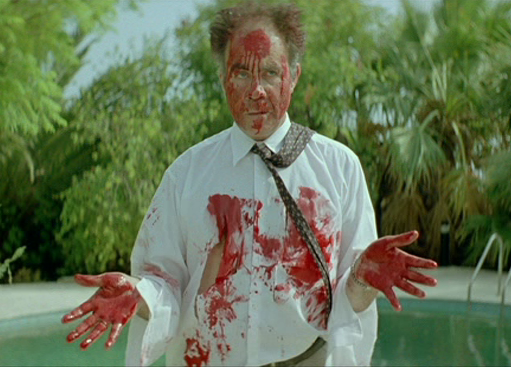
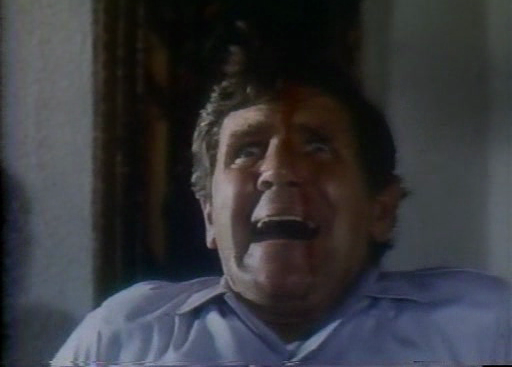
The title suggests that Anna is the protagonist. I mean, usually the possessive determiner "my" suggests a character whose perspective we'll be sharing throughout the film: My Bodyguard, My Beautiful Laundrette, My Night at Maud's, My Dinner with Andre, My Life as a Dog, My Neighbor Totoro, My Best Friend's Wedding. But Anna is too unreliable and unstable a character to make a sympathetic
lead (I guess My Cousin Vinny and All About My Mother are similar exceptions - any "my" movie to mention a family member is apparently going to be about that person.) She relishes her role as Karl's replacement mother, arrogantly announcing things like "If I don't get dinner started, there'll be no dinner at all." She's unrelenting in her nagging, constantly ordering Karl to wear his glasses, demanding "Are you going to spend all day in bed?" and giving him ultimatums
such as "No more make-believe people!", a weird way of saying "stop vicariously murdering our mother by whaling on a store dummy with a fireplace iron" that sounds more like she's criticizing him for having imaginary friends than begging him to face the reality of the situation. By filling in for the missing parent she's completely desexualized herself and become a spinster at 28, although by specifically focusing on Karl rather than Anna the movie hints that it might be by choice, that Karl
masturbating in the wide-open doorway as she models before the mirror - she makes little attempt to confront him after he gives himself away - is something she's allowing to happen. Subconscious or otherwise, it's a way for her to feel desired and give Karl the taste of sensualism that his isolated existence requires at the same time. "You're my brother...we're SUPPOSED to be good to one another," she insists, although she fails to realize how much they rely on one another and just how unsound the relationship.
The shell is slowly cracked open with the introduction of a new body into the household, a rugged drifter named Tony who almost runs Karl down with his motorcycle on the beach as Karl is running naked to the water. Although initially jarred by the near-miss, Tony decides he needs a bath so he strips down and joins Karl in the ocean (he carries his own soap around!) and afterwards lets Karl ride around in circles on the bike, laughing and cheering
him on the whole time. Quite accidentally he's stepped in to take over Anna's role as all-purpose family member for Karl, first as a friend or even intimate (given that their first meeting culminates with an crude yet casual and weirdly fulfilling skinny-dipping), then as a father figure, beaming proudly and encouraging Karl as he learns to ride the bike. Karl brings him home for dinner and, although Anna sees this intruder as a threat to her role as Karl's surrogate parent, Tony ends up offering - again, not
consciously - to be the same thing for Anna. Like many a fast player, he understands the situation in the house and provides an ear for Anna's frustrations and a warm body to press up against. Tony gives Anna an option not previously available to her: a strong male presence to both justify her control over Karl's life and give her the "correct" kind of attention she needs. This is bad news for Karl: he can expect more obnoxious over-mothering from Anna and less of an open bedroom door policy at night
with Tony shacking up with his sister. Tony immediately becomes like a stepfather, making demands and assumptions and ordering Karl to move the empty wheelchair out to the garage. To make matters worse, by stepping into the father role, Tony has cast himself as the family member of whom Karl is the most mistrustful, given that his real dad murdered his mother and created his current situation with Anna.
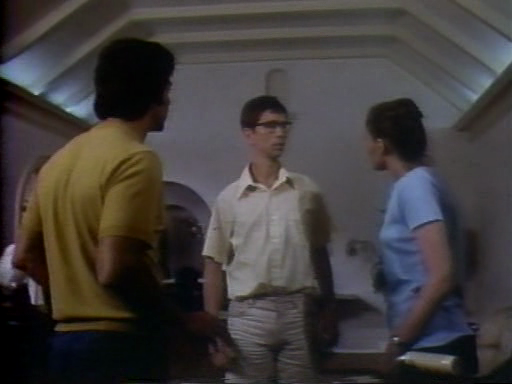
If this all sounds less like a horror film than a Tennessee Williams* play, it's just because I'm psychoanalyizing these characters to death in order to access the movie's strange set-up. I don't want to sound too much like Viggo Mortensen, but there seems to be a lot going on under an artificial surface that can only be partially credited to amateur actors hamming it up in a low budget movie. For instance, in a dinner sequence that's already
awkward enough with the bizarre staging of characters (Karl and Tony crammed into the corner on one end of the table and Anna at the head as opposed to one on either side of her - table placement hasn't been this thematically significant since Citizen Kane), the actor playing Tony is clearly fake-eating his food - in one shot he doesn't even have any food on his fork. This wouldn't be so blatant if Karl weren't shoveling chicken into his mouth between lines in a delicious series of "eat beats" that
play like this...
"See (eat), Anna watches out for me. Someone has to watch out for me, so Anna does. I can't be treated like an adult in front of my guests. (eat) You see Tony, Anna enjoys looking after me and she spends all her waking hours doing it, too. And as long as she does, she feels secure (eat) knowing I won't harm anyone or get into any trouble."(eat)
At the risk of sounding like an interpret-happy arthouse theater audience member, maybe Tony's a mannequin. Throughout the film, Karl treats his collection of store dummies like real people, having conversations with them and occasionally beating them to death. Although the other two prominent dummies aren't properly introduced, there's a man-mannequin who Tony and Anna discover in Karl's bed after a particularly violent dream and a, pardon the expression,
dolled-up female-mannequin Karl keeps hidden in the closet. It's possible that Karl's Calvin-and-Hobbes relationship with his department store window chums has spread to his sister: both are independently desperate for a change in their life and family structure, so rather than discourage Karl's delusional behavior Anna has adapted it herself. I'm just saying it's a possibility. Like the momma-mannequin, Karl tries to create a friend/father from the "Tony" dummy only to be frustrated by Anna, who
steals it for her own use (she insists that Tony is just staying for Karl's sake when she's the one who really can't let this possibly-plastic stud go.) It would explain the weird placement of Tony at the dinner table, and the sibling's fighting to gain Tony's approval ("He knows better...and he also owns a bathing suit!" Anna chides Karl after learning of his nude swimming. "So do I," Tony points out. Of course he would, if he models them in a store window!) It fits in with the overall incestuous
scheme of the house. Tony shows up and Karl is caught sleeping with a male mannequin. The friendly postman looks like the murderous father and may even be played by the same actor (the video transfer is too dark to tell for sure) and ends up standing - or rather, sitting - in for the mother when his unfortunate decision to rest for a moment in the wheelchair gets him killed by Karl. Karl peeps at Anna, who is sister and mother to him, cooking dinner and watching disapprovingly as he woofs it down ("He eats
like that all the time," she confides in Tony.)
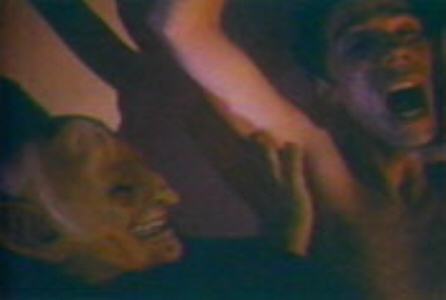
Naturally, food is a favorite motif of the greatest surrealists - Buñuel and Švankmajer - and this film's director, while not in the same league, is at least a reject from the same school. Unfortunately the revealing dinner sequence doesn't lead to a dancing chicken dream sequence, but just the fact that dreams are such a pointedly important part of the story suggests surrealist leanings. Androgynous demons pull Karl out of bed and use ceremonial
knives to make stigmatic lacerations under his chest (see next paragraph), mimicking Buñuel's iconic razor-to-eye imagery. Anna appears in the dream, taunting a tortured Karl by aggressively brushing her hair in front of him, her long, straight strands the fetishistic symbol from his earlier peeping session - just as it was for the man visiting the tomb of his dead sister only to find her silky locks still growing like Doña Elvira's to bookend The Phantom of Liberty (which also makes a flowing visual foil
to the vibrissa of Jeanne Moreau's armpit hair in Diary of a Chambermaid, or the close-ups from Un Chien Andalou. There may even be a famous Buñuel hairbrush sequence that I'm forgetting here.) Masks and mannequins recall the marionette motifs of Švankmajer, particularly the tree stump that substitutes a real baby in Little Otik (Karl would love having Otik around, since he eats cats!) Rather than a corpse the "mother" is a dummy, so it's like Psycho (Karl even has an unthreatening
stuffed owl, the low budget version of a study of stuffed birds casting ominous shadows) meets The Criminal Life of Archibaldo de la Cruz, complete with substitution mannequin murder scene.
If I'm really going to continue down this path where I compare a largely forgotten B-movie to Buñuel, I might as well go the whole way and mention its religious imagery. The architecture of the house is almost church-like, most of the action taking place in the large living with tall, arched ceilings. The first shot of the interior pans across the room from a youthful picture of Karl's mother to a life-sized statue of the Virgin
Mary to the dummy in its wheelchair, a visual succession of mother's transition from living entity to sainted figure made of plastic. Karl "kills" this version of his mother to spare her the sight of his sins: sloth (his habit is to sleep until late afternoon), gluttony (the way he goes voraciously at that chicken), lust (spying on his sister), pride (complaining about not wanting to be treated like a child), envy (his obvious admiration of Tony), wrath (the eventual murders) and greed (more like selfishness
I guess - demanding attention and wanting Anna to himself.) Karl, shirtless in giant tighty whities that look like a loincloth and resembling Jim "Jesus" Caviezel's nerdy younger brother, paints a Christ-like figure in his dreams and even plays fugitive, tellingly remarking to his hidden dummy "Thank god they didn't find you too!" This dummy is his personal devil: she doesn't make an appearance until Tony has completely usurped the household, and is always positioned by Karl's ear as though
suggesting evil things for him to do, which Karl probably doesn't even consider evil. He tells Mr. Phillips the mailman "I don't like to see people suffer," hinting that his upcoming murder spree is a cleansing of those around him whose problems he recognizes as suffering. After he's committed the final double murder and left the house, his send off to the bodies is "May god bless you and keep you both" - the voiceover is immediately followed by a visually jarring long shot of Karl on the
motorcycle ascending a towering incline on the parkway when he and the bike disappear seemingly into the sky, as if to heaven, the score building to a sinister surge of overlapping strings.
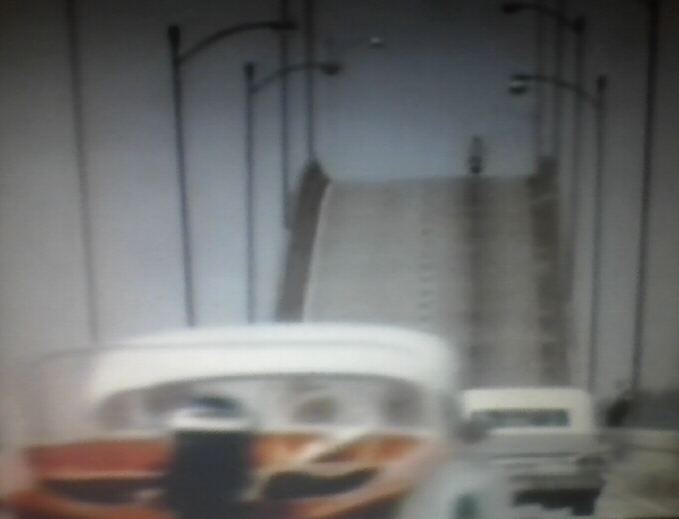
Although he has a decent sense of humor (he tells his mommy-mannequin "Here's the new issue of Look. Have you seen it? You can LOOK at it later...") Karl has got to be one of the most wretched and repugnant heroes in movie history. Tormented by memories of his alcoholic father pummeling his mother to death in her wheelchair, he still keeps the same fire poker murder weapon around the house. Beyond practicality (why waste a perfectly
good fire poker?), keeping the prop leaning against the fireplace is an attempt to normalize it back to domestic utility, to allow it to fit in with the other everyday items as if it never saw the inside of an unfortunate woman's skull. Yet it's the first thing Karl grabs when he reenacts the crime first with the mother-dummy, then against poor Mr. Phillips the postman, whose war wound limp Karl obsesses over as a handicap akin to whatever kept his mother defenseless in her wheelchair. Until Tony's reintroduction
of a dominant male in the house sparks his murder spree, Karl has remained a stunted man-child, enjoying tuna fish sandwiches and wearing the same outfit of short-sleeved shirt and short short jeans every day (at least the shorts are tight so as to avoid anything hangin out - that'd cause some bad dreams.) Anna says he's "like a child at times...he's intelligent, but he's not," blatantly ignoring her own role in suppressing his ignorance of the world, which Karl sums up with the defensive declaration
"It's just that there's some things I've never been TOLD." Like a happily naïve little kid, he goes to the end of the rocks by sea, spreads his arms and cries "GOOD MORNING, WORLD!" in what seems like a normal ritual for him: he longs to escape the confines of the house, but can't psychologically pull himself away from what happened there. To equalize what remains of the family with the absent mother and father, Karl offers two victims - Mr. Phillips and Tony - in place of the parents and
destroys himself and Anna to completely devastate the unnatural balance of the household.
To paraphrase Tolstoy, "All happy families are alike; aberrant, incestuous brother and sister pairings racked by survivor's guilt who go skinny dipping in Tampa and keep mannequins in the closet are homicidal in their own way." I mentioned the Tennessee Williams link earlier, and the dummies are as much a simulacrum of a troubled family as the little glass unicorns are symbolic of whatever people more familiar with that play than
myself care to attach them to. With the mother out of the picture, Anna is like Amanda and Laura Wingfield rolled into the same character: although Karl is the "crippled" one with his mannequin menagerie, Anna is both parental figure and mentally delicate sibling. As much as Karl is an underdeveloped adult, Anna is the one playing house with her dinners and bill-paying and approval/disapproval of Karl's actions. The big twist isn't that the father killed the mother (we know that about 10 minutes into
the movie) but that Anna's role as head of the house allegedly came from an act as heinous as Karl's eventual killing carousal. What Karl pieces together from conversations with the postman before pummeling him to death is that Anna actually aided and abetted dad after mother's murder, helping him to toss the body body into the bay. Even though it's never clearly stated, Anna was obviously motivated in her actions to do whatever she had to do to keep what remained of the family together. Nothing was going to
bring mother back, but why should it have to necessarily result in father being taken away? Hence her attitude years later, casting a forgiving eye on Karl's mannequin mauling and molesting, bed wetting and occasional violent tendencies...she's not doing it to protect him from the truth so much as she's trying to maintain what brittle slip of a semblance of family life that's left. Whether an incestuous devotion to daddy existed before mommy got put down, Anna has no problem filling in for mom once she's bagged
and tagged - the implication is that she would have taken over the role of wife had daddy not been sent to jail.** Again, all of this is merely implied by Mr. Phillips talking - possibly out of his ass - to Karl, who makes his own assumptions about what went on and how Anna was involved...even in death, she neither confirms or denies his accusations.
It's time to fess up to some extent: most people would probably find My Brother Has Bad Dreams tedious and poorly made. I'm not interested in disputing that (there are scratches on the print and you can hear airplane noise in all the outdoor dialogue scenes, for instance) but it's really not the point. When there's something going on in a movie my interest is peaked, and there's absolutely something going on here that lasts from beginning
to end. It's not necessarily achieved by eye-opening direction or mind-blowing storytelling, and certainly not by conventionally "believable" performances. There's clear artistic intention behind this thing - just check out this beautiful Bergman-esque framing:
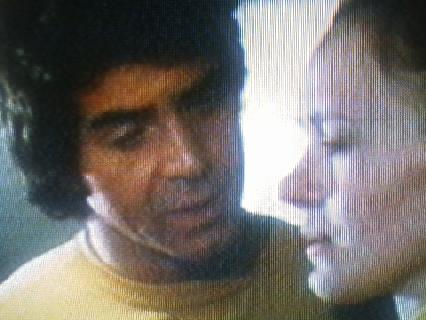
I'm only bringing that up now to highlight a scene that's so well directed and acted that it really sticks out to me, even after making it through the brilliantly weird finale which I'll get to in just a minute. Karl's murder of Anna and Tony plays out in slow motion in the middle of the night: he stabs Tony repeated in the back, then sticks the knife into Anna's chest, topping it off by carving an "x" into his sister's exposed skin.
The first time I watched the movie I thought he was using her to wipe blood off the knife, but I guess the director wanted to make a connection to the real-life Manson murders (Charlie having instructed his followers to carve an "x" into their foreheads during their murder trial) because he handles the double homicide as realistically and disturbingly as a true crime. But the really impressive scene comes afterwards. A still-living Anna manages to crawl to the middle of the darkened staircase, where
Karl finds her sitting there as still and defenseless as one of his mannequins. "Hi big sister. Now where did you think you were going? That was very disloyal of you to leave Tony like that," he chides, mocking the loyalty to family ties that's led her to this end. It's the opening of a rising tirade during which Karl unleashes all the allegations as to Anna's part in their mother's murder, accuses her of being the one who really needed help ("You were using me to cover up your own insanity!")
and blames his sister for his lifestyle ("I owe you everything I have, Anna, which is a dull, abnormal life inside the walls of this SICKENING HOUSE!") The remarkable thing is that Anna refuses to respond, and merely watches Karl through the strands of her bloodied hair.*** The actor playing Karl's flagrant overacting actually works really well here because of it - the dynamic has shifted for the final time, with Karl the maniac melting down as Anna stares sadly. Even though it's too dark to see, you
can tell they're both crying when he brings the knife down to finish her off. Her heavy breathing is cut off by a mute scream and she slumps over the staircase.
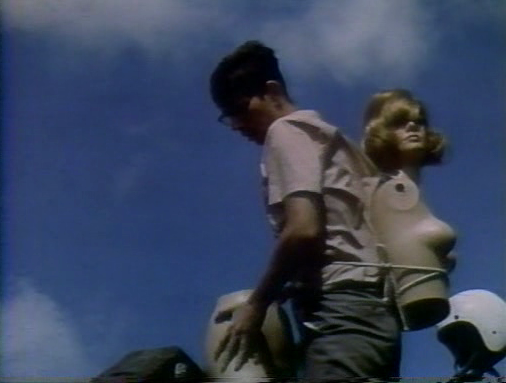
I directly quoted Anna Karenina earlier, and the film has a very Anna Karenina ending...except less Russian and more completely fucking crazy. A conventional denouement to this kind of movie (at least to suit its student film leanings) would be for Karl to replace everyone he's killed with mannequins - two males for Tony and the mailman, one female for mother and another for Anna - and continue his existence, pretending that this
is his perfect family. Instead, the morning after the murder he straps the upper half of his favorite lady dummy/accomplice (after the murder he assures this particular dummy "It's done now - you can relax") to his back and heads out on Tony's motorcycle. It's a truly weird thing to see and reminded me of Chewbacca carrying a mutilated C3-P0 on his back at the end of Empire Strikes Back. The sight must seem strange in public too, since a police cruiser blares its siren and tries to pull Karl
over. This leads to an odd "chase" since Karl flat out doesn't stop. Although you'd think the cop could easily overtake him, the inept officer manages to flip his cruiser - it explodes, of course - and Karl continues on his merry way. Finally coming to a halt on the lower half of a traffic bridge, Karl tosses his beloved mannequin to the water below. Then he slits his wrist and jumps into the water himself - where he is INSTANTLY EATEN ALIVE BY A SCHOOL OF SHARKS!! Not wanting the shock of this bizarre
turn of events to wear off on the audience, the director plays the end credits over freeze frames of Karl being devoured:
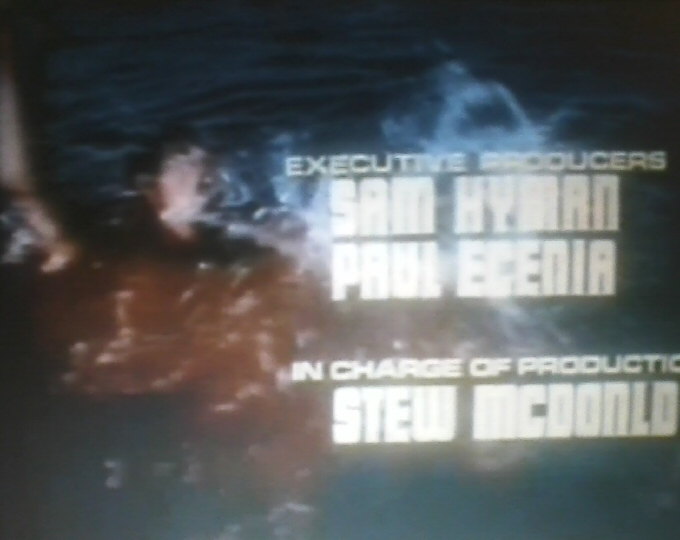
Man, I'd hate to be the homicide detective assigned to this case. "Subject bludgeoned postman, buried corpse in yard, stabbed drifter to death in bed, mutilated sister on stairs, sent cruiser off the road causing explosion during high speed pursuit, jumped into ocean accompanied by made-up mannequin, eaten by sharks." Only in Florida! It really is the perfect seedy setting to this unsettling story. In death, Karl refutes Marlow's
quote in Heart of Darkness "We live, as we dream — alone." Karl's dreams were filled with people invading his tiny room: weird masked dancing demons plagued his sleep. So in death, he took everybody with him, making it one big family affair - he even let a gang of sharks participate. The ending of the movie is so weird and spectacular it's like something out of a dream...there's probably more to that, but I'll let it lie.
APPENDiX,
or what i later learned
I really do try to find forgotten videos for this series, and this one seems largely ignored by the internet. That's good because it's always exciting to write about something that hasn't been analyzed from every angle by every asshole with a computer. It's bad because I found very little information on the action behind the scenes.
The movie's original title was Scream Bloody Murder, but another film was already coming out under that name. That one, which was the big screen debut of Phantasm's Angus Scrimm, appearing under a different name himself, "Rory Guy," is about a serial killer with a hook for a hand who never actually uses his hook to kill anyone.
The cover of the VHS, which was released 15 years after the film was made, is a reliable depiction of what happens in the movie: a guy dressed up like Karl (albeit with a weird wig that's nothing like the real guy's near-crew cut) complete with horn rimmed glasses and white short sleeve shirt splattered with blood holds a fireplace iron in one hand and his favorite female mannequin in the other (not sure whether or not this is the same mannequin who starred in the film; since the VHS came out in 1988 it could be
the mannequin from Mannequin.)
Director Robert J. "Bob" Emery, who also helmed The Bittersweet Night and Dare the Devil (the debut of Ray Wise, who would of course play the devil himself on Reaper) must have been a local Florida filmmaker, as all of his future work - The Florida Connection and Ride in a Pink Car, both from '74 - are set in the Sunshine State, although in the 80's he branched out across America with films like The
National Forests of Utah, The National Forests of Arizona, The National Forests of Wyoming...three years and seven movies later he wrapped up his life's work right back where he began with The National Forests of Florida.
Marlena Lustik (Anna) has no further films listed on her imdb page. Paul Vincent (Tony) had a bit part in Arthur but appeared in nothing else of note.
According to imdb, Nick Kleinholz III, whose performance as Karl belongs in the pantheon of bizarre B-movie actors that includes John Reynolds and Deborah Reed, died one year after the movie was originally released, aged 28. Shockingly young, but I haven't been able to find any further information on that. I did manage to find an obituary confirming the death of HIS brother, from June of this year (that obituary lists him as "the late
Nicholas III.") Is Kleinholz one of the seemingly unending group of untimely suicides among Video Oddities stars, as well as the great John Reynolds?
Maybe not. Stick with John the Internet Sleuth for a minute here. After working here and there in television for over a decade, Bob Emery wrote and directed a film called Swimming Upstream in 2002. It features a protagonist named Morris Bird III, a young man in love with a girl who learns he has terminal cancer. Is it possible this was a masked biography of the late Nicholas III, struck down by cancer before he reached the age of 30?
No, it's just a coincidence: that movie is based on the 1970 novel The Greatest Thing That Almost Happened by Don Robertson, the third part of a trilogy starring Morris Bird III (repeatedly referred to by his full name throughout the three books.) In the book he has cancer, etc...it's all the same.
Anyway, Kleinhoz and Emery had worked together once before, on the 1970 release Love Commune - "15 Hot-Blooded Young Drop-Outs Living in One Room!" - a hippy melodrama that, unlike Emery's later, sunnier pictures, is set during a harsh Cleveland winter. The movie was given a video release by Frank Henenlotter's Something Weird Productions under its alternative title, Ghetto Freaks. It's a feature length narrative,
culled together from a lot of experimental filmmaking, such as engaging real people on the street in cinéma vérité fashion. Apparently Emery wanted it to seem as "real" as possible.
Jesus, now I'm worried...did Emery actually feed Nick Kleinholz to the shark at the end of shooting for the sake of realism? I truly hope that's not the case.
The video box of My Brother Has Bad Dreams was recommended for inclusion in this series by Christopher Funderburg, who was close to showing a print of the movie (without seeing it) at the Jacob Burns' 24 Hour Movie Marathon. Good thing he didn't - I don't think it's the JBFC audience's cup of tea.
~ OCTOBER, 2011 ~
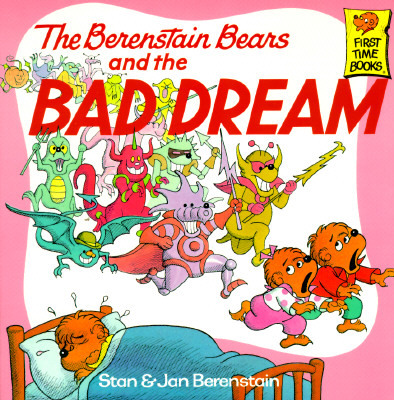
* Himself a permanent resident of Florida.
** It's interesting that the dad wasn't executed for the crime - that must have been a conscious choice on the writer/director's part, to further the idea of father being an existing presence in the world of the film, just as his memory is a constant torment to Karl and possibly a reason for Anna to carry on (the idea that dad might come home some day.)
*** I wish I could get a still of this, but the image is impossibly dark.
COMING SOON...
MONGREL!
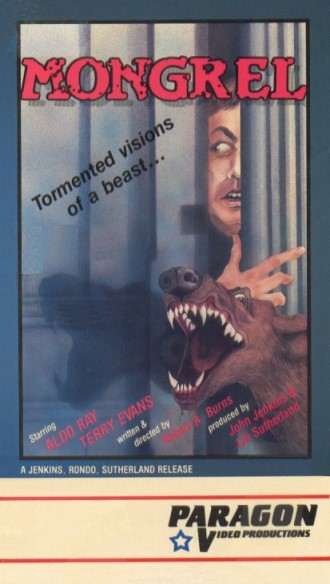
 I'm basing my selections on the outrageous video boxes, the kind that helped us decide whether a movie looked like it was worth our time back in the days before the internet started telling us everything there is to know about every film before they're even released. Then I'm writing about my VHS safari.
I'm basing my selections on the outrageous video boxes, the kind that helped us decide whether a movie looked like it was worth our time back in the days before the internet started telling us everything there is to know about every film before they're even released. Then I'm writing about my VHS safari.













